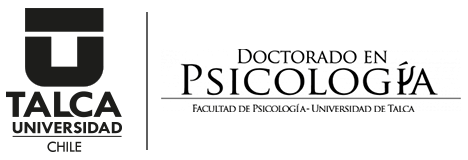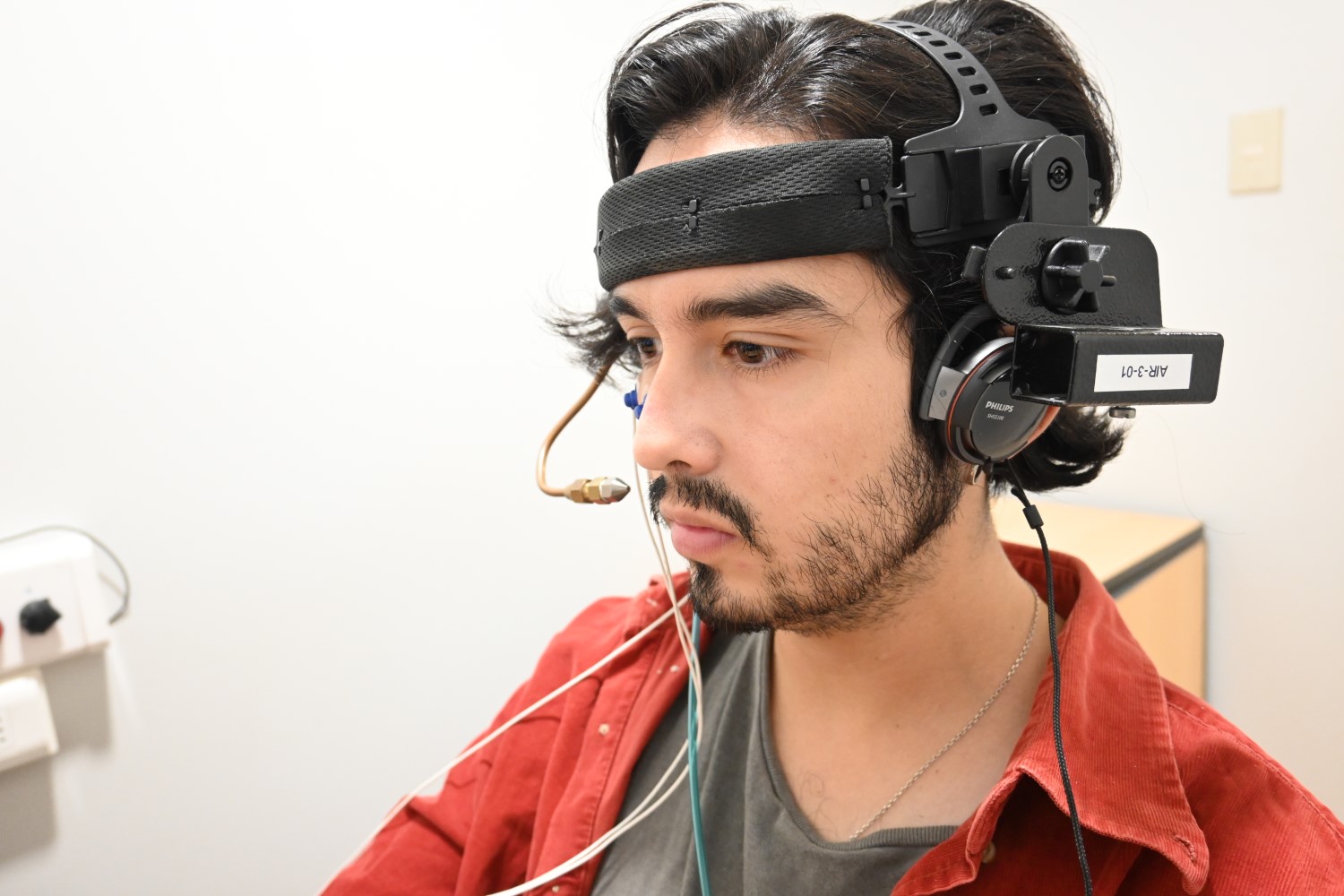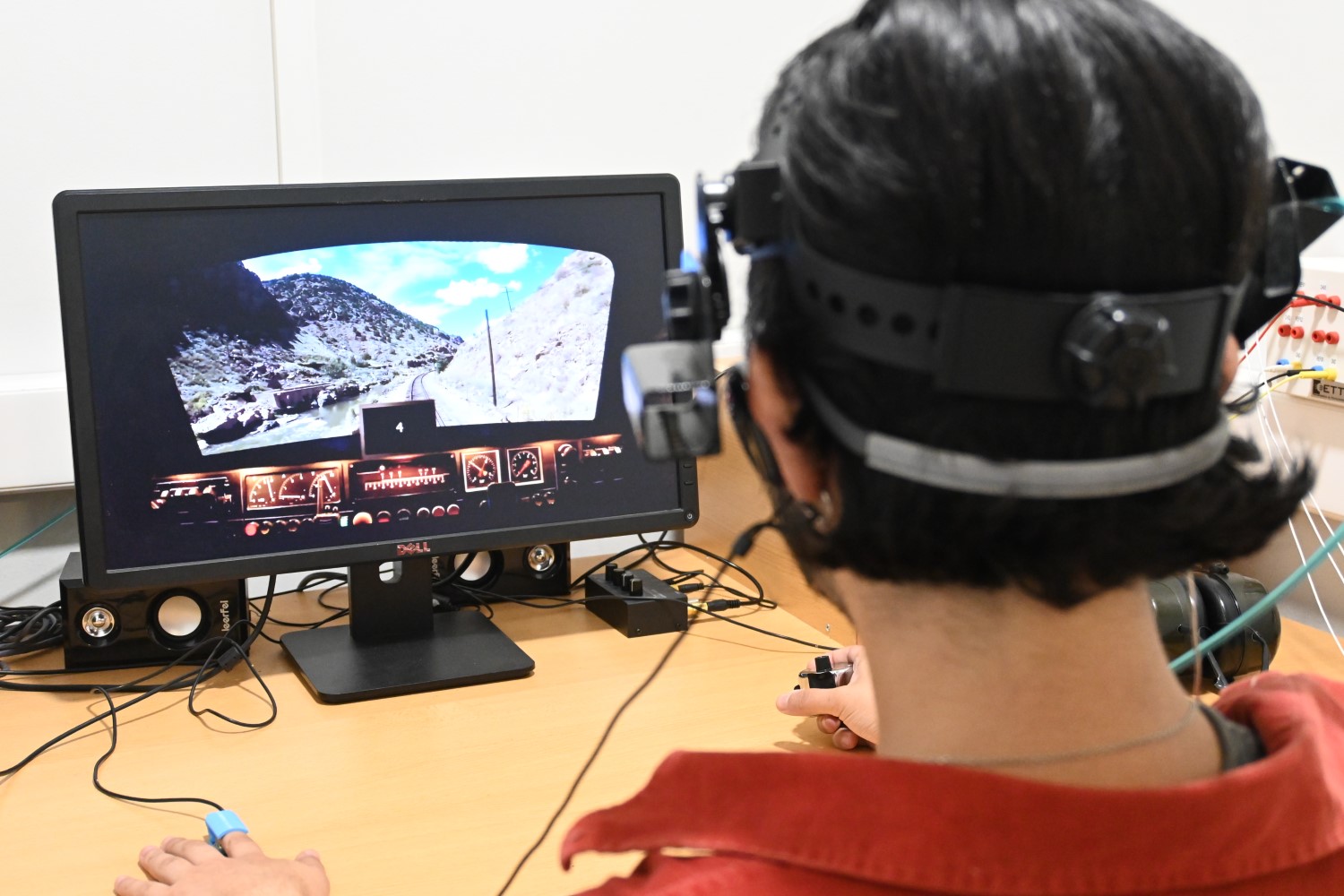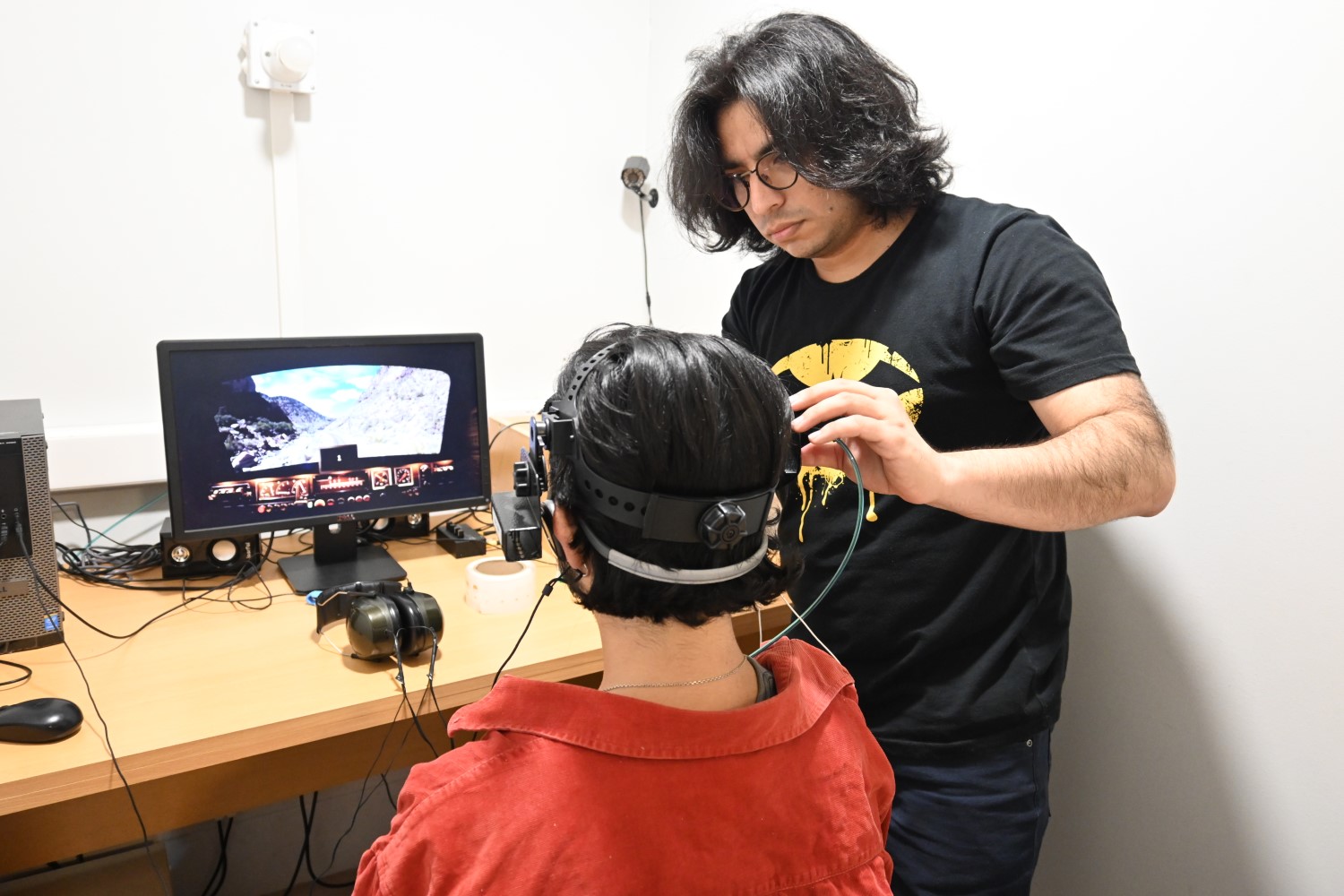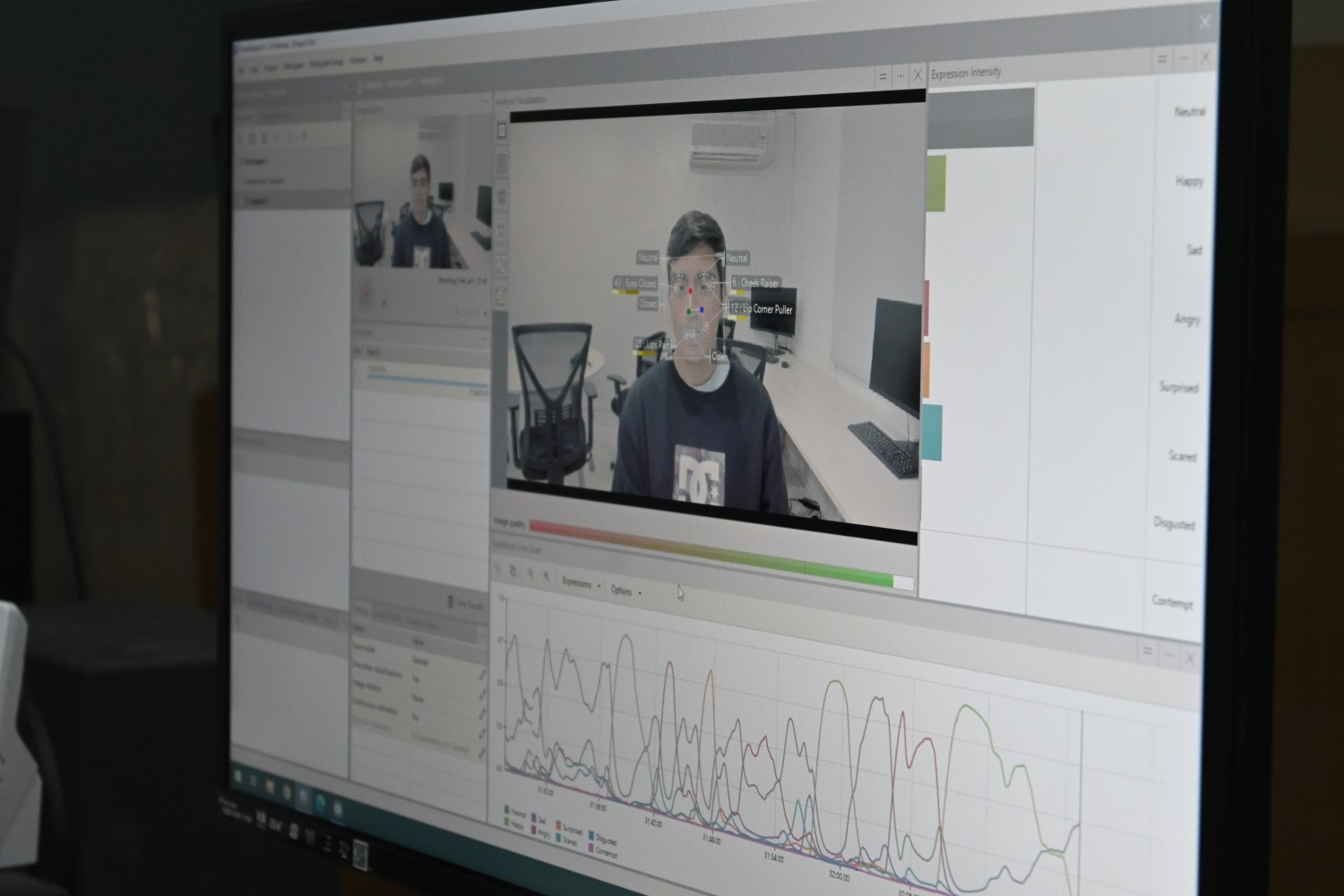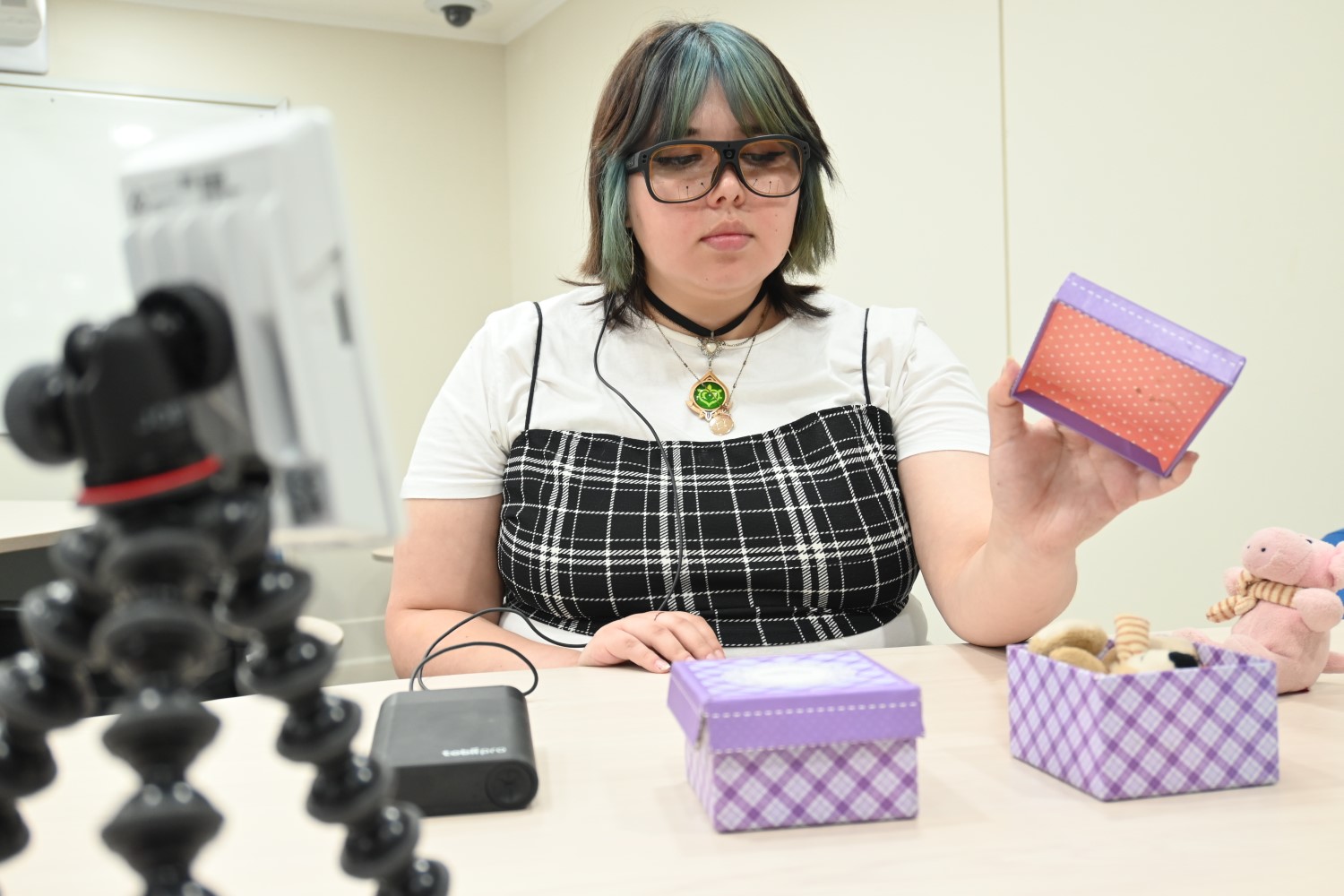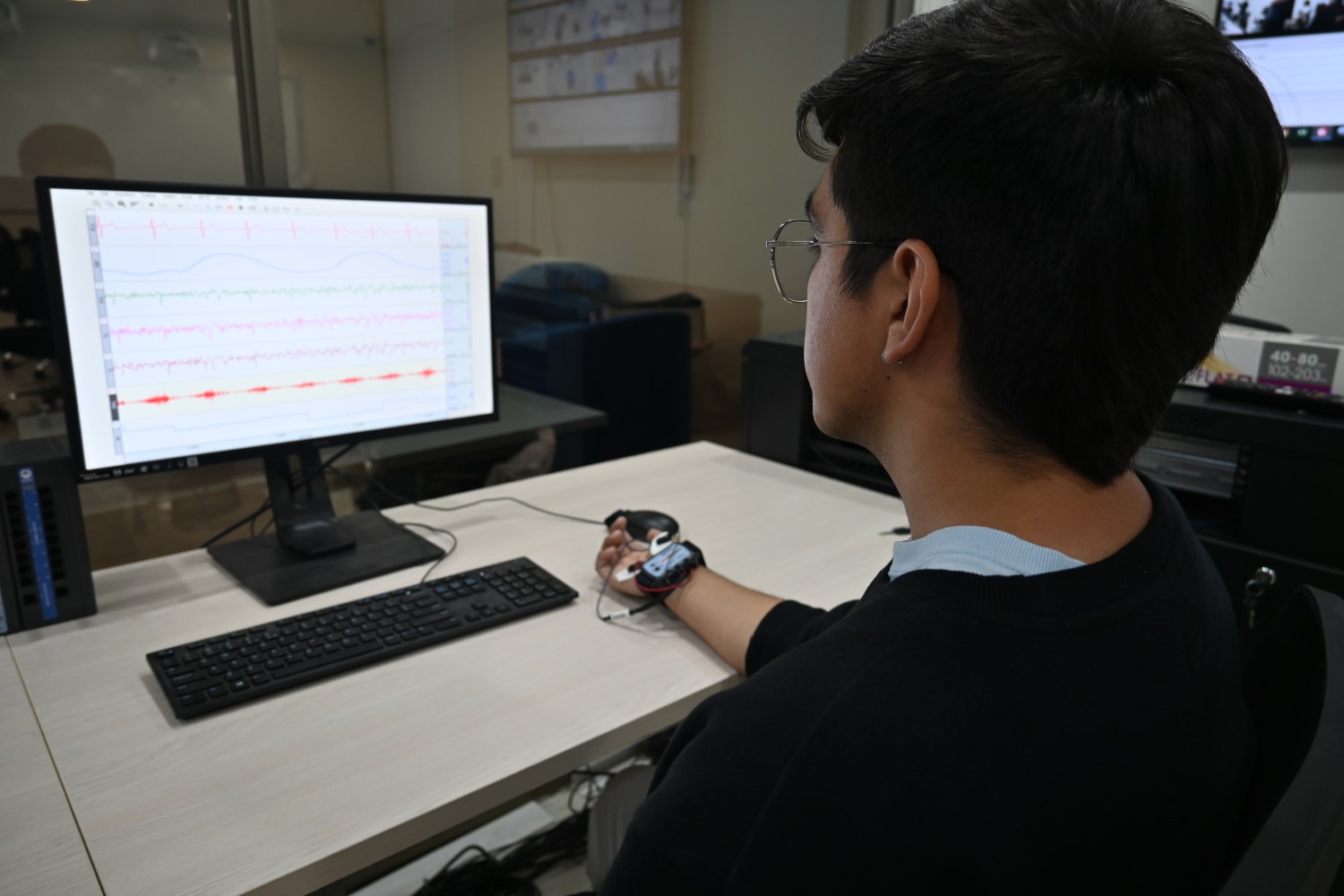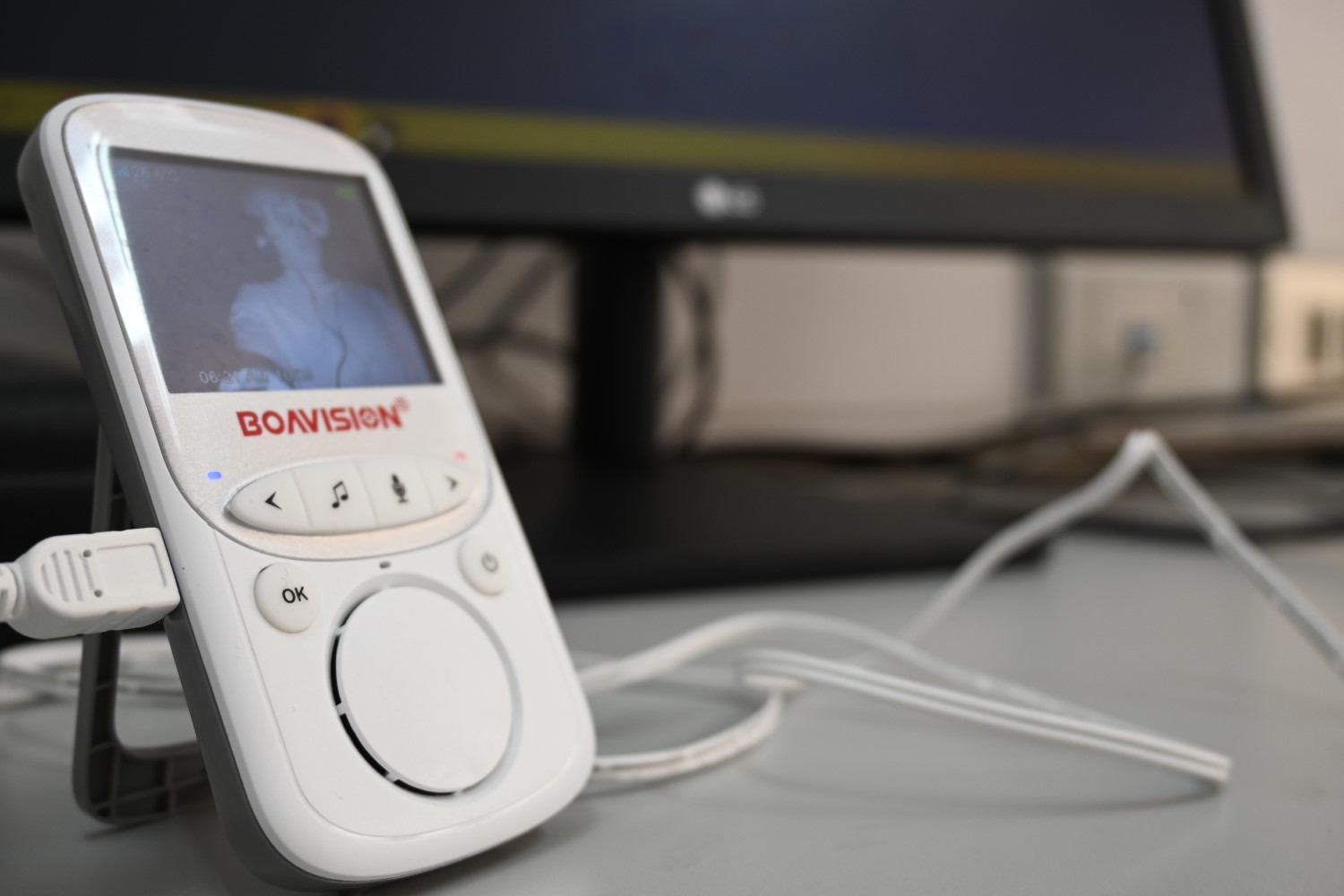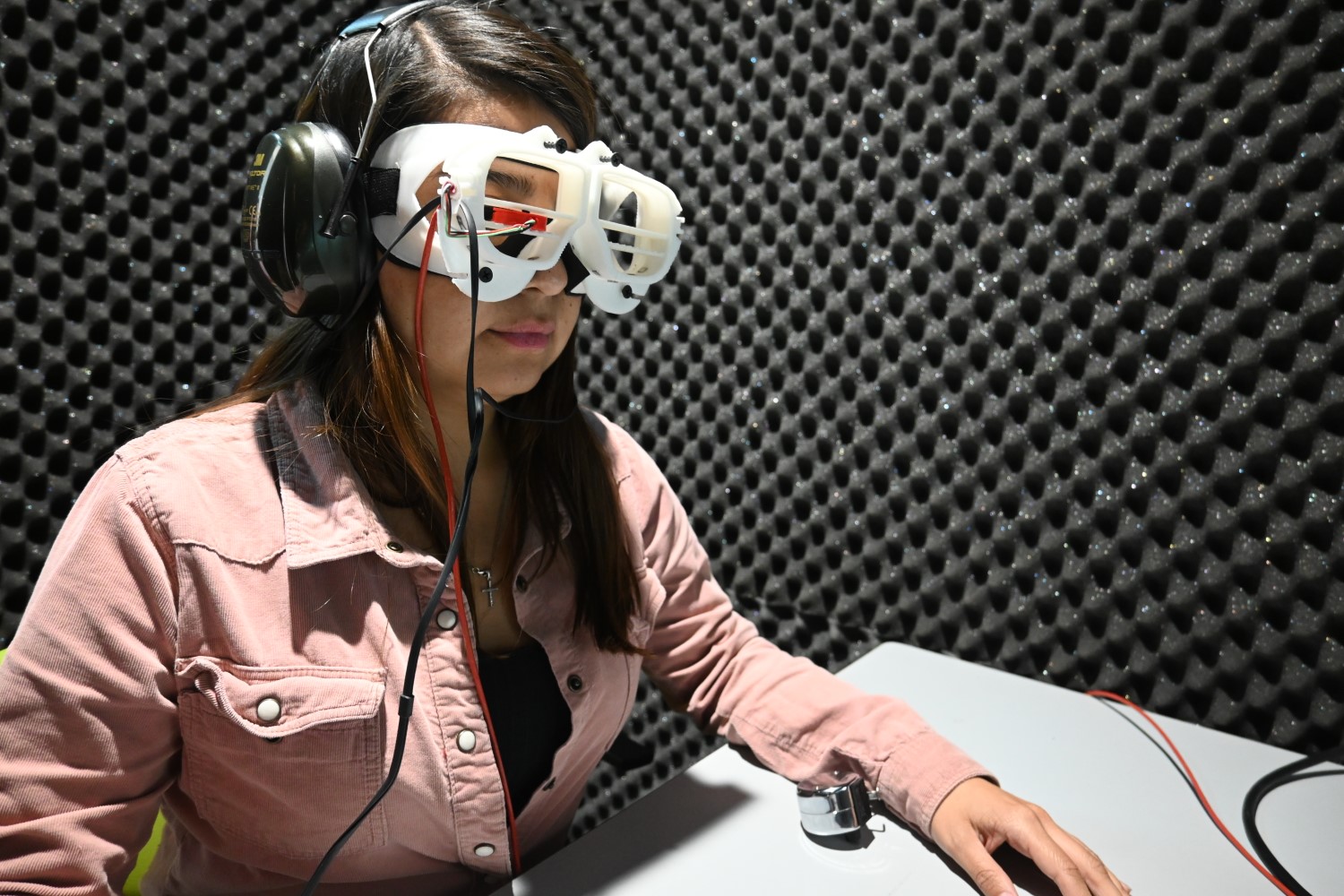Laboratories
The Faculty of Psychology has laboratories that allow academics and students to conduct research. These spaces are directed by PhD academics and are available for the development of projects associated with the different research areas of the Doctorate.
Basic Experimental Psychology Laboratory
Director: Dr. Edgar Vogel
The Basic Experimental Psychology Laboratory, built with funding from the FONDEQUIP EQM130088 project, is a research space designed for the integrated and functional measurement of sensory-perceptual behaviors in humans. Its equipment includes a central control unit and synchronized devices for the generation of stimuli in different sensory modalities, in addition to recording responses of the facial musculature, eye movement and motor reaction through cameras. It has software that allows the programming of experiments with ease, in addition to the ability to present stimuli in any sequence and combination.
Research Areasstrong
, lbBasic Learning Processes. Classical conditioning. Operant conditioning. Habituation.
Some associated articles
- Pérez, O.D., Vogel, E.H., Narasiwodeyar, S. & Soto, F. (2022). Subsampling of cues in associative learning. Learning & Memory. https://doi.org/10.1101/lm.053602.122
- Uribe-Bahamonde, Y.E., Jorquera, O., Becerra, S. & Vogel, E.H. (2021). SOP- habituation laboratory: An interactive tool for simulating the basic behavioral features of habituation. Behavior Research Methods. https://doi.org/10.3758/s13428-021-01548-y
- Jorquera, O.E. & Vogel, E. (2020). A simple and low-cost, but naturalistic method for introducing students to action potentials. Brazilian Archives of Biology and Technology. https://doi.org/10.1590/1678-4324-2021200245
- Vogel, E.H., Ponce, F.P., & Brandon, S.E. (2020). Can the stimulus processing assumptions of the sometimes-opponent-process (SOP) model explain instances of contextual learning? Journal of Experimental Psychology: Animal Learning and Cognition. http://doi.org/10.1037/xan0000251
Laboratory for Research and Analysis of Cognitive, Instrumental and Social Interaction
Director: Dr. Ramón Castillo
The Laboratory for Research and Analysis of Cognitive, Instrumental and Social Interaction, built with funding from the FONDEQUIP EQM190153 project, was born as a scientific space within the Center for Research in Cognitive Sciences (CICC) dedicated to the study and analysis of behavior and human interaction. It has high-end equipment for the integrative measurement of physiological responses, as well as for the collection of motor behavior data such as eye tracking and emotional responses. It has workstations and specialized software for the observation and development of individual, dyadic or group experimental situations.
Research Areasstrong
, lbCognitive neuroscience. Instrumental interaction. Social cognition. Neurophysiology.
Some associated articles
- Rubio, F., Neira, C., Villacura-Herrera, C., Castillo, R.D. (2022). First and second-Order Theory of Mind as predictors of cooperative behaviors in preschool and school children. Psykhe. https://doi.org/10.7764/psykhe.2021.36317
- Valenzuela, A. & Castillo, R.D. (2022). The effect of communicative purpose and reading medium on pauses during different phases of the textualization process. Reading and Writing. https://doi.org/10.1007/s11145-022-10309-y
- González, C., Castillo, R.D., Franzani, J. & Martinich, C. (2021). Screening of developmental difficulties during the transition to primary school. International Journal of Environmental Research and Public Health. https://doi.org/10.3390/ijerph18083958
- Morales-Bader, D., Castillo, R.D., Olivares, C. & Miño, F. (2020). How do object shape, semantic cues, and apparent velocity affect the attribution of intentionality to figures with different types of movements? Frontiers in Psychology. https://doi.org/10.3389/fpsyg.2020.00935
Translational Research Laboratory, Applied Research Unit, CEPA.
Coordinator:: Mg. Natalia Cancino Letelier
The Laboratory of the Center for Applied Psychology has two experimental rooms to carry out basic research in contexts closer to people. Experimental room 1 consists of a central control unit and synchronized devices to generate stimuli in the different sensory modalities (lights, sounds, gusts of air and images on the computer screen). Additionally, there is an external contiguous observation space. It is equipped with transducers to record facial muscle responses (via electromyography), eye movement (via infrared sensors), changes in heart rate (via a heart rate monitor) and responses on the computer keyboard. Experiment scheduling and data collection is done through experimenter-friendly software.
Experimental room 2 is an electrically isolated room (Faraday cage) intended for the execution of electroencephalography experiments.
Research Areas
Habituation and attentional processes; psychopathology and stress.
Some associated articles
- Cancino, N., Ramos, N., Mendoza, C., García, M. & Schott, S. (2022). COVID-19 and Mental Health Challenges: Remote Care Experience from a University Psychology Center. Revista Sul Americana de Psicología, 10(1).
- Celedón, K., & Kreither, J. (2021). Relationship between difficulties in emotional regulation and characteristics associated with attention deficit hyperactivity disorder in Chilean university students. Cuadernos de Neuropsicología/Panamerican Journal of Neuropsychology, 15(1).
- Hernández, F., Plaza, J., & Kreither, J. (2021). Attention Deficit Hyperactivity Disorder in Adults: A Systematic Review of Therapeutic Approaches. Psicoperspectivas, 20(1), 44-55.
- Sehatpour, P., Dondé, C., Adair, D., Kreither, J., Lopez-Calderon, J., Avissar, M., … & Javitt, D. C. (2021). Comparison of cortical network effects of high-definition and conventional tDCS during visuomotor processing. Brain Stimulation: Basic, Translational, and Clinical Research in Neuromodulation, 14(1), 33-35.
- Sehatpour, P., Dondé, C., Hoptman, M. J., Kreither, J., Adair, D., Dias, E., … & Javitt, D. C. (2020). Network-level mechanisms underlying effects of transcranial direct current stimulation (tDCS) on visuomotor learning. Neuroimage, 223, 117311.
- Uribe-Bahamonde, Y. E., Jorquera, O. E., Becerra, S. A., & Vogel, E. H. (2021). SOP-habituation laboratory: An interactive tool for simulating the basic behavioral features of habituation. Behavior Research Methods, 53(5), 2120-2126.
Clinical Psychology Laboratory
Associate Professors:
Andrés Fresno, Daniel Núñez, Nadia Ramos, Rosario Spencer.
The Clinical Psychology Laboratory of the Faculty of Psychology arises from the need to have a space for the scientific study of psychological processes related to mental health, clinical relationships, adaptive psychological development and the manifestation of psychological problems and psychopathology. The laboratory is made up of a space with 4 workstations for undergraduate and graduate students, guest academics and research assistants and a spy room/mirror for the observation of human behavior. It is in the process of being equipped, and so far it has instruments for the measurement of physiological and emotional responses, and for the observation of individual behaviors and interaction between people.
Research Areas
Attachment, parenting, and psychopathology; Abuse, traumatic stress, PTSD, and complex PTSD; Early Detection and Intervention in Psychopathology and Suicidal Behavior; Neurocognitive Processes in Clinical Populations Such as ADHD
Some associated articles
- Campos, S., Núñez, D., Bravo, P., Fresno, A., & Olff, M. (2022). Preliminary evidence for internal structure, sensitivity, and specificity of a brief PTSD and complex PTSD measure in adolescents. Canadian Journal of Behavioural Science / Revue canadienne des sciences du comportement. Advance online publication. https://doi.org/10.1037/cbs0000322
- Hernández-González, O., Spencer-Contreras, R., de la Torre González, B. & Mejías, B. (2022) Teachers’ responses to anxiety in students with autism spectrum disorder: Proposal of a predictive model. Spec eduk i rehabilitacija; 21:255-268. [DOI: 10.5937/specedreh21-37792]
- Núñez, D., Guajardo, V., Gaete, J., Libuy, N., Mundt, A., Ibañez, C. (2022). The influence of adverse childhood experiences on suicide-related behaviors among adolescents in Chile. Archives of Suicide Research. doi.org/10.1080/13811118.2022.2134067
- Cancino Letelier, N., Ramos Alvarado, N., Mendoza Núñez, C., García Zerene, M. del P., & Schott Gaete, M. S. (2022). Covid-19 and Mental Health Challenges: Remote Care Experience from a University Psychology Center. Revista Sul-Americana De Psicología, 10(1), 149–168. https://doi.org/10.29344/2318650X.1.3207
- Forslund, T., Granqvist, P., van IJzendoorn, M H…. Fresno, A…. (2021) Attachment goes to court: child protection and custody issues, Attachment & Human Development, DOI: 10.1080/14616734.2020.1840762
- Fresno, A., Arias, V., Núñez, D., Spencer, R., Ramos, N., Espinoza, C., Bravo, P., Arriagada, J., & Brunet, A. (2020). Using Exploratory Structural Equation Modeling (ESEM) to Examine the Internal Structure of Posttraumatic Stress Disorder Symptoms. The Spanish journal of psychology, 23, e48. https://doi.org/10.1017/SJP.2020.46
- Heather, W., Núñez, D. (2022). Psychotic experiences, emotion regulation, and suicidal ideation among Chilean adolescents in the general population. Frontiers in Psychiatry, Adolescent and Young Adult Psychiatry. doi: 10.3389/fpsyt.2022.983250
- Langer, A. Núñez, D., Waardenar, K., Wigman, J. Ulloa, J.L. (2022). A Latent Profile Analysis of psychotic experiences, non-psychotic symptoms, suicidal ideation and underlying mechanisms in a sample of adolescents from the general population. Frontiers in Psichiatry. doi: 10.3389/fpsyt.2022.926556
- Spanish version. (2022). Attachment Goes to Trial: Child Custody and Protection Issues. Yearbook of Legal Psychology, 32, 115-139. https://doi.org/10.5093/apj2021a26
Social, Organizational and Educational Psychology Laboratory
Director: Emilio Moyano
Associate professors:
Hedy Acosta, Carolina Iturra, Andrés Jiménez, Emilio Moyano, Ismael Gallardo, José Manuel Cárdenas, Cristian Rojas, Héctor Vargas, Doris Méndez, Pablo González.
Post-doctorates: Felipe Besoaín, Ángel Valenzuela
The Laboratory of Social, Organizational and Educational Psychology is a research space designed for the experimental and non-experimental study of basic psychosocial processes and their applications. Its equipment includes a work unit for doctoral students and postdocs, a meeting room and a room equipped with 12 all-in-one computers, with MediaLab and DirectRT software for conducting experiments, Atlas-TI and other data analysis software. In addition, the laboratory has a highly immersive virtual reality equipment for use in the research areas pertinent to the laboratory.
Research Areas.
- Virtual social communication.
- Processes of change and formation of attitudes.
- Violence, Trauma, and Transitional Justice Processes.
- Women’s health within the medical model.
- Impact of prejudice and discrimination on the quality of life and well-being of minority groups.
- Qualitative Methods and New Developments in Research
- Diagnosis and intervention in psychosocial processes
- Work-Life Balance and Quality of Work Life
- Institutional Culture of Gender and Workplace Well-being
- Work and Family Expectations
- Subjective, psychological, and social well-being. Happiness and discomfort.
- Decision-making and social factors of aging.
- Workplace accidents and work fatigue.
- Social Anthropology, Cultural Heritage and Territory.
- Educational Psychology: Psychology of Learning (socio-emotional and cognitive aspects).
- Developmental Psychology: Early Education and Adolescence.
- Psychology: General Health.
Some associated articles
- Besoaín, F., & Gallardo, I. (2023). Think About It: Promoting Physical Activity with a Mobile App with a Theory-based Approach. IEEE Access. https:// doi.org/10.1109/ACCESS.2023.3265891
- Rubio, C., Gallardo, I., & Besoaín, F. (2023). Promoting Healthy Behaviors Through an RPG Videogame: An Elaboration Likelihood Model Based Approach. IEEE Transaction on Games.
- Cárdenas, M., Arancibia, H., Bahamondes, J. y Figueiredo, A. (2022). Symbolic Exclusion and Historical Negation Regarding the Indigenous Mapuche People: A Study of Their Moral and Ideological Causes in Chile. Race and Social Problems, 14, 342–356. http://doi.org/10.1007/s12552-022-09358-3
- Cárdenas, M. y Salinero, S. (2022). Obstetric Violence in Chile: Women’s Perception and Differences by Type of Care Center. Revista Panamericana de Salud Pública, 46:e24. https://doi.org/10.26633/RPSP.2022.24
- Gómez-Urrutia, V., Figueroa, A. J., Díaz, N., & Valladares, F. (2022). Work and Family Balance in Chilean Young People’s Life Plans. Journal of Family Issues, 0(0). https://doi.org/10.1177/0192513X221127022
- Jimenez-Figueroa, A.; Busto-Ramirez, A. &, Orellana-Cornejo, M. (2023). Work-family conflict, perception of gender equality and subjective well-being of health officials in the Maule Region. Cienc. Psicol. [online]. 17, n.1 [citado 2023-04-12], e2904. Available in: <http://www.scielo.edu.uy/scielo.php?script=sci_arttext&pid=S1688-42212023000101207&lng=es&nrm=iso>. Epub 01-Jun-2023. ISSN 1688-4094. https://doi.org/10.22235/cp.v17i1.2904.
- Gil-Flórez, A., Llorens, S., Acosta-Antognoni, H., & Salanova, M. (2022). Basic Psychological Needs at Work: Their Relationship with Psychological Well-being and Healthy Organisational Out-comes with a Gender Perspective. International Journal of Environmental Research and Public Health, 1-18. 10.3390/ijerph19053103
- Salanova, M., Acosta-Antognoni, H., Llorens, S., & LeBlanc, P.M. (2021). We trust you! A multilevel-multireferent model based on Organizational trust to explain performance. International Journal of Environmental Research and Public Health, 1-21. 10.3390/ijerph18084241
- Rojas-Barahona, C. A., Gaete, J., Véliz, M., Castillo D., R., Rámirez, S., & Araya, R. (2022). The effectiveness of a tablet-based video game that stimulates cognitive, emotional, and social skills in developing academic skills among preschoolers: study protocol for a randomized controlled trial. Trials 23, 936 https://doi.org/10.1186/s13063‐022‐06875‐9 (Q1).
- Valenzuela, D., Turunen, T., Gana, S., Rojas-Barahona, C.A., Araya, R., Salmivalli, C., & Gaete, J. (2022). Efffectiveness of the KiVa Antibullying Program with and without the Online Game in Chile: a Three‐Arm Cluster Randomized Controlled Trial. Prevention Science. https://doi.org/10.1007/s11121-022-01379-z (Q1)
- González B., Pablo y Morales Y., Alejandro (2021). The geolocation of the archaeological heritage of Maule. The discovery of the first cave painting site. Nadir: Electronic Journal of Southern Geography, 13. ISSN: 0718-7130.
- Vargas-Garrido, H., Moyano-Díaz, E. & Andrades, K. (2022). Sleep problems are related to commuting accidents rather than to workplace accidents. BMC Public Health 21, 652. https://doi.org/10.1186/s12889-021-10737-5
- Alvear-Vega, S., Vargas-Garrido, H. (2022). Social determinants of malnutrition in Chilean children aged up to five. BMC Public Health 22. https://doi.org/10.1186/s12889-021-12455-4
- Moyano-Díaz, E., & Mendoza-Llanos, R. (2021). Yes! Maximizers Maximize Almost Everything: The Decision-Making Style Is Consistent in Different Decision Domains. Frontiers in Psychology, 12.
- Moyano-Díaz, E., & Mendoza-Llanos, R. (2021). Membership, Neighborhood Social Identification, Well-Being, and Health for the Elderly in Chile. Frontiers in Psychology, 11.
